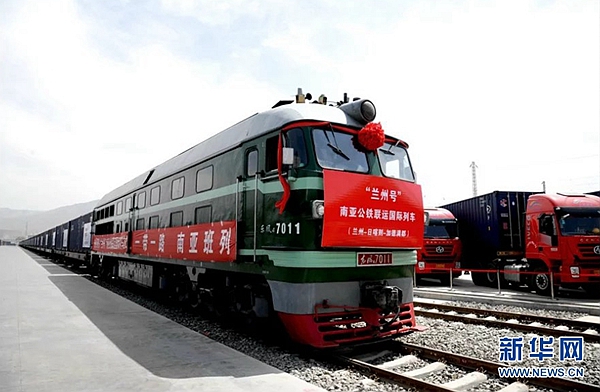Nepal-China ties gather pace under President Xi
- By Ritu Raj Subedi
 0 Comment(s)
0 Comment(s) Print
Print E-mail China.org.cn, October 21, 2017
E-mail China.org.cn, October 21, 2017
 |
|
China opens its first combined transport service to Nepal on May 11, 2016. [Xinhua] |
Nepal-China relations have witnessed accelerating momentum since President Xi Jinping assumed office in 2012. During his first five-year tenure, the two nations signed landmark deals aimed at boosting mutual cooperation, connectivity, infrastructure development, trade, economy and cultural bond.
President Xi has a diplomatic vision of "comprehensively developing relations with peripheral countries, consolidating good-neighborliness and friendship, and deepening mutually beneficial cooperation."
In his opening remarks at the 19th National Congress of the Communist Party of China (CPC) in Beijing last Wednesday, he highlighted China's policies towards neighboring countries, saying relations would be deepened "in accordance with the principles of amity, sincerity, mutual benefit and inclusiveness."
The Belt and Road Initiative (BRI) that President Xi unveiled as his flagship global project in 2013 has significantly defined China's foreign relations. Considered to be a project of the century, the BRI so far has brought together around 70 countries to seek shared prosperity.
China envisions Nepal as the gateway to South Asia under the BRI, and nations such as Pakistan, Bangladesh, Sri Lanka and the Maldives are already participating. China seeks to integrate its comparatively underdeveloped western pockets in Tibet, Sichuan and Yunnan with South Asia through massive investment in roads, railways, commerce, industry and public diplomacy.
In May 2017, Nepal joined the BRI with a hope of obtaining long-term benefits through a myriad of projects. It expects to see the arrival of the railway from China by 2025. The line has already reached Shigatse in Tibet, and will have been extended to Kerung near the Nepal-China border by 2020.
To finance its ambitious infrastructure plans, in November 2014, Nepal became a member of Asian Infrastructure Development Bank, an international lending agency with China as its chief stakeholder.
However, it is the trade and transit treaty that the K.P. Sharma Oli-led government signed with China in March 2015 that really marks an historic point of accelerating momentum in Sino-Nepal ties. The two nations signed 10 vital accords during Oli’s visit to China for promoting all-round economic, diplomatic and cultural cooperation between them.
The trade and transit treaty carries geopolitical dimensions. It provides Nepal with access to the sea via Chinese territory. Nepal as the landlocked country has long sought unhindered access to the sea to diversify its trade and commerce, especially by reducing its longstanding dependence on India.
Nepal and China have supported each other in times of crisis. While Nepal had played a crucial role in ensuring China's entry into United Nations and stability in Tibet in the past, China has generously helped Nepal in its economic development to overcome backwardness.
China came to the rescue when Nepal was hit by devastating earthquake and crushing Indian blockade in 2015. It committed to providing 76 billion Rupees for the reconstruction of houses and infrastructures damaged by the quake. It offered precious fuel to Nepal during the Indian embargo. In October 2015, a framework of understanding was achieved that enables Nepal to buy one-third of its fuel needs from the northern neighbor.
During Xi's first term in office, Nepal and China have been engaged in other important bilateral activities. Nepal became a dialogue partner of the Shanghai Economic Cooperation (SCO) in 2016, allowing it to participate in a range of SCO activities. The two nations conducted their first ever joint military drill in April 2017 to boost their defense diplomacy and cooperation.
In an investment summit held in Kathmandu in March 2017, Chinese investors pledged the biggest amount, US$8.2 billion, for Nepalese development. In August this year, Chinese Vice Premier Wang Yang paid a visit to take bilateral relations to new heights through an array of accords and understandings.
China has constantly been appreciating Nepal for its One-China policy and it also liked Nepal's neutral position on the recent Doklam impasse with India. One of the defining features of China’s foreign policy is that it has never interfered in the internal affairs of neighbors.
In this context, President Xi noted that China would oppose acts wherein big and strong countries impose their will on and interfere in the internal affairs of small and weak countries. "China will never seek hegemony or engage in expansion," he declared.
This sort of commitment on the part of the big neighbor has boosted the confidence of small nations like Nepal.
Ritu Raj Subedi is an associate editor of The Rising Nepal.
Opinion articles reflect the views of their authors, not necessarily those of China.org.cn.





